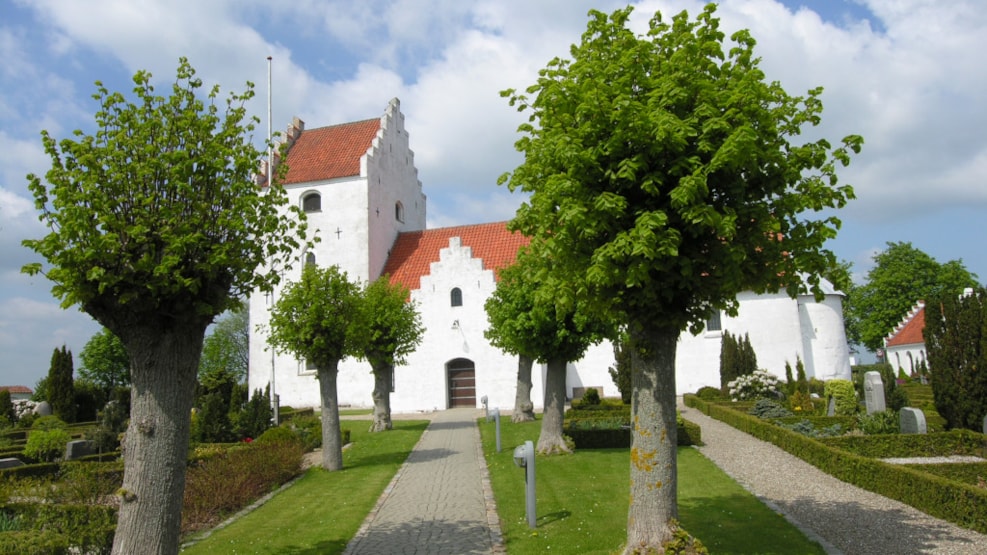
Falling Church
This church south of Odder has been closely connected to the nearby Åkjær Estate throughout history. The Romanesque church features fascinating historical furnishings from many centuries.
The Church at Åkjær
Falling Church was built in the late 12th century, presumably by a local nobleman. During the Middle Ages, most Danish churches were owned by the Catholic Church, and Falling Church was no exception—it was owned by the Diocese of Aarhus. The church likely played an important role at the time since the parish estate, Åkjær Estate, located 1.5 kilometers to the west, was also owned by the Diocese of Aarhus. Åkjær became the bishops' main estate south of Aarhus, forming a massive fief that owned hundreds of farms. Falling Church, being the closest church, likely enjoyed certain privileges.
When Denmark became Protestant during the Reformation in 1536, both Åkjær Estate and Falling Church were confiscated by the king. The king owned both until 1661, when they were handed over to Joachim Gersdorff, Denmark's Steward of the Realm (Prime Minister). Gersdorff was given a vast amount of land around Odder as compensation for losses in Skåne, Sweden, a well-known story in the Odder area, as Gersdorff's descendants left a significant mark on the region. Falling Church followed Åkjær until 1810, when it was sold to local farmers. The church was referred to as the "Chapel of Åkjær" and served as the estate's private chapel.
In 1908, the church became self-owned.
About the church
Falling Church is, in many ways, a classic Danish village church. Located in the open countryside just outside Falling, the whitewashed church with its red-tiled roof, and saw-toothed tower and porch, stands out—almost as a perfect image of a village church.
The church consists of a chancel and nave from the 12th century, along with a tower and porch added around 1350. In the 18th century, a burial chapel was added for Åkjær's owner, Hedvig Margrethe Bornemann. At the entrances to the churchyard, two portals from the late Middle Ages stand as characteristic features of the church. Before entering, take note of the stonework from the 12th century in the walls.
Inside, Falling Church has a bright and warm interior. You will quickly notice the chancel arch, preserved in its original form, featuring interesting stonework. The church’s oldest piece of furniture is the baptismal font from around 1225. The font belongs to the so-called "Horsens-type," decorated with carvings of lions.
The pulpit is the oldest in the Odder area, dating back to 1585. The altarpiece (1635) was made by the renowned woodcarver Peder Jensen Kolding from Horsens, who created altarpieces and pulpits for many local churches. He also crafted the church's memorial plaque for Provost Hans Rasmussen Skjolde.
The burial chapel
Of all the owners of Åkjær, Hedvig Margrethe Bornemann did the most to maintain and develop the church. She added the burial chapel on the north side of the church in honor of her late husband, Colonel Mathias Rosenørn. Her own beautiful, richly decorated coffin was later added, along with a memorial plaque for her.
A bizarre story surrounding Hedvig Margrethe Bornemann's coffin is that three parish clerks opened it annually to change her stockings. Yes, you read that right! This practice continued until 1961. It was believed that her will stipulated this, but upon review of the will, it was found to be untrue—a myth taken very seriously by the staff. Today, the coffin is sealed, and the practice has ended.
Want to visit Falling Church?
Falling Church is open when staff are on the church grounds, typically during regular working hours on weekdays. The caretakers are usually on the premises during this time, but there are no guarantees—they may be elsewhere.
More historical attractions
The Kystlandet region offers many exciting historical attractions, from ancient history to industrial heritage. From museums to architectural landmarks and natural attractions. On this page, you can find inspiration for historically interesting experiences near Horsens, Odder, and Juelsminde.